

|
|
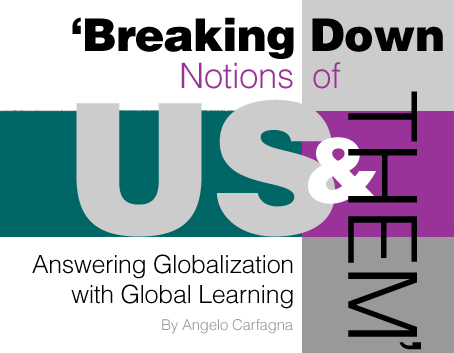
If, as Fairleigh Dickinson University President J. Michael Adams observed, “Globalization is altering every dimension of our lives,” the question becomes, “What should we do differently?” Adams asked, “Particularly for those of us concerned about educating the next generation of citizens and leaders, what do we need to do to develop the necessary skills, insights and understandings?” |
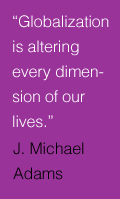
|
That question aptly set the stage for a two-day conference on “Developing Global Competencies in Higher Education,” held at Fairleigh Dickinson’s College at Florham April 4 and 5. Designed to foster a dialogue among educators about global education and global citizenship, the program was sponsored by the University’s Office of Interdisciplinary, Distributed and Global Learning and the Internationalization Collaborative of the American Council on Education (ACE) — and supported by a grant from the AT&T Foundation. Speakers included Adams, current and former United Nations ambassadors; a sociology professor who has written two books on globalization; a leading international advocate from ACE; a veteran study-abroad administrator; key members of FDU’s global education efforts, particularly faculty involved in using technology to bring the world to the classroom; and members of the University’s innovative Global Virtual Faculty program. More than 75 college faculty and administrators from East Coast universities, including 18 FDU faculty and staff, attended the conference. A Need for Global Citizenship“Responding to globalization means adopting a global view,” Adams suggested. “It means becoming a global citizen. With globalization has come a greater realization that our fates are now linked. A world view must be adopted with a sense of and sensitivity to today’s interconnections, to our shared destinies and to the magnificent differences among us.” 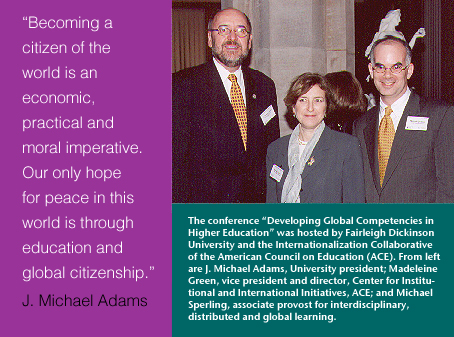
Describing the expansion of the global economy and the global challenges that necessitate cooperation, Adams said, “Becoming a citizen of the world is an economic, practical and moral imperative. Our only hope for peace in this world is through education and global citizenship.” Making a similar case was Ahmad Kamal, president of The Ambassador’s Club at the United Nations and former ambassador of Pakistan to the United Nations. Pointing out that globalization is part of a much longer historical process, he said, “Globalization is all about a shrinking world. It is about acting on a stage that is a single home rather than divided into nationalities.” Kamal, who was instrumental in developing the University’s U.N. Pathways Lecture Series and who teaches several courses at FDU, said the most important first step to meeting global challenges was to improve Americans’ knowledge of geography. His second suggestion was to avoid what he called the “disease of self-centrism.” He explained, “Each of us believes, ‘I am the center of the world.’ But there is much more of the world outside of you and it is your duty to search for what the rest of the world can bring you. Global education is an exciting invitation to explore this rich world.” 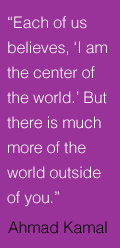
Fairleigh Dickinson University Assistant Professor of Philosophy and Political Science Jason Scorza pointed out that, while some are skeptical of the notion of global citizenship, it’s an entirely conceivable concept. “Citizenship at its root means being a full and equal member of a community, with all the rights and responsibilities of a full and equal member, and hopefully, the capabilities and skills necessary to both fulfill one’s responsibilities and enjoy one’s rights. From this perspective, we can imagine ourselves as citizens of any number of different kinds of communities — including the global community.” President Adams, who has inspired a mission of providing a global education at FDU, was asked about what specifics should be introduced to help transform a learning environment. He answered, “It’s less about making particular changes than it is about how you view what you’re doing. You need to view education as a process and take advantage of the resources you have, but the real issue is how you view what you’re trying to do. The specifics will flow from that new mindset.” Madeleine Green, vice president and director of ACE’s Center for Institutional and International Initiatives, said she has learned that, to provide successful international initiatives, leadership plays a strong role and the “faculty make it happen.” She further pointed out that institutions must address why they are doing this, and resources must be identified and aligned. Also, supporting structures are needed, and partnerships must be created with businesses and institutions abroad. It’s not a quick process, she added, instead it’s “a long-distance run.” Unfortunately, according to Green, “there is more rhetoric than reality” on today’s college campuses. She encouraged those in the audience to start the conversation on their campuses. Noting that recent surveys reveal public support for and student interest in international programs, she said “we need to figure out how to tap it.” Defining the SkillsWhat should global education instill and what skills are needed by global citizens? Among those tackling the questions was Scott Sernau, an associate professor and chair of the department of sociology and anthropology at Indiana University, South Bend. Sernau is the author of, among other books, Bound: Living in the Globalized World. Echoing Adams and Kamal, Sernau framed the subject in the context of globalization. He stated that globalization has long been driven by the three Cs: commerce, control and curiosity — which reflect the three dimensions of globalization: economics, politics and culture. Despite some potential setbacks for globalization, these underlying processes “are not going away.” Sernau referred to a list of nine goals for globally competent learners developed by the American Council on International Intercultural Education. The globally competent learner, 1) is empowered by the experience of global education to help make a difference in society; 2) is committed to lifelong, global learning; 3) is aware of diversity, commonalities and interdependence; 4) recognizes the geopolitical and economic interdependence of the world; 5) appreciates the impact of other cultures on American life; 6) accepts the importance of all peoples; 7) is capable of working in diverse teams; 8) understands the nonuniversality of culture, religion and values; and 9) accepts responsibility for global citizenship. 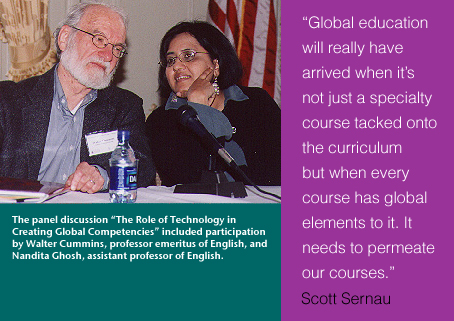
But this is just a start, he emphasized. Educators need to provide more than just a taste of global learning. “Global education will really have arrived when it’s not just a specialty course tacked onto the curriculum but when every course has global elements to it. It needs to permeate our courses.” Among other skills mentioned by Sernau are some new ones (Internet skills, how to find and assess information), some old ones (world history and geography) and some timeless skills (intercultural communication, how to communicate with those from different backgrounds and, most importantly, how to listen to other perspectives). But to fully define the skills needed, he emphasized, would require a cross-cultural dialogue. “This can’t be defined by American academicians deciding what our students need to learn about the world. It has to emerge from a global conversation.” Encouraging Study AbroadFacility with foreign languages would be important to emphasize, suggested both Sernau and Kendall Brostuen, dean of the Institute for International Studies at Lock Haven University of Pennsylvania. Brostuen, who has overseen 28 student and faculty exchange programs in 20 countries, gave special significance to the role of study-abroad programs. “One cannot truly understand the subtleties of another culture without first having been a part of it.” |
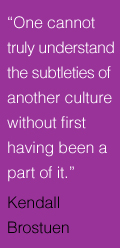
|
He said educators should go beyond just endorsing study-abroad programs as wonderful opportunities and make it clear “that the institution itself fully expects that students will engage in an international experience.” One of the conference’s keynote speakers, H.R.H. Prince Zeid Ráad Al Zeid Hussein, permanent representative of Jordan to the United Nations, went a step further and recommended students study and work in other parts of the world. In his address, “Education in the Multilateral World,” the ambassador discussed the tension between the local and the global in a globalized world. “The challenge before us, therefore, is our need to remain true to our locality yet without prejudice to our developing a broader understanding of the wider human family, and our place in it, and its place in the universe. Only, therefore, through the provision of a formal education that’s both broad and specific, will we succeed.” Conclusions ReachedWe return to the question of what exactly are global competencies? In concluding dialogues, breakout sessions involving all the attendees created specific reports fusing the various definitions and practices addressed during the event. One group concluded that global competencies boiled down to the “knowledge, attitudes and skills that equip students to live and to work in a globally interdependent world and exercise the rights and responsibilities of global citizenship.” Another session broke down the essence of global competencies into the following parts:
Among the many recommendations endorsed by the groups were having an institutional commitment to global education, thinking beyond and across disciplinary lines, empowering faculty to infuse global issues throughout the curriculum, enlarging student experiences, offering faculty incentives, using non-U.S. source material, emphasizing the importance of study abroad and international internships and using “whatever pedagogical means necessary to unglaze students’ eyes.” Several challenges in the delivery of a global education were raised, including resistance from colleagues and the lack of time to prepare and incorporate global lessons into the curriculum. (For full group reports, see www.globaleducation.edu.) The FDU ExperienceAs the host institution, Fairleigh Dickinson University was able to showcase a number of its global education efforts. Its unique distance-learning initiative requires every undergraduate to take one distance-learning course per year and features Global Virtual Faculty — scholars and practitioners from around the world who engage students in online discussions about global issues. (FDU recently became one of 11 universities nationally awarded special recognition from ACE and AT&T for its use of technology as a tool for internationalization.) Building on those experiences, Fairleigh Dickinson faculty presented “The Role of Technology in Creating Global Competencies,” moderated by Jason Scorza, with Walter Cummins, professor emeritus of English; Nandita Ghosh, assistant professor of English; and Francis Ingledew, associate professor of English and comparative literature and director of special programs, University Core Program. Scorza, who co-created two of FDU’s online courses for the distance-learning initiative, cautioned that, while technology can help provide a global education, there are also dangers. “The Internet at its best can be a magnificent classroom but at its worst it’s an open sewer. It misinforms as much as it educates.” 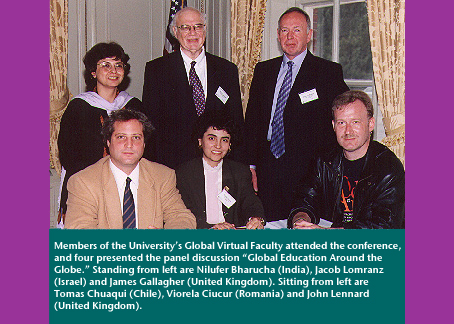
Similarly, while Ingledew observed that the “Web opens up to students a quantitatively different experience from the traditional classroom,” it demands significant attention, and we must guard against the illusion that the world is so easily found at our fingertips. Walter Cummins shared with the audience examples of student online exchanges across cultures in a course, Nobel Literature, that he developed with a fellow FDU faculty member. “These kinds of exchanges are breaking down notions of us and them. They would not be possible without the technology.” Nandita Ghosh, who is teaching an online course using Global Virtual Faculty, says these scholars and practitioners “are giving me and my students a sense of interconnectedness” with the rest of the world. She adds that they challenge common assumptions and provide a real sense of the cultural differences that exist in the world. Four GVF members (seven in total attended the conference) took their turns at giving presentations. In a session titled “Global Education Around the Globe,” Nilufer Bharucha (India), Viorela Ciucur (Romania), Tomas Chuaqui (Chile) and John Lennard (United Kingdom) discussed how their countries viewed global education and their experiences with Fairleigh Dickinson’s distance-learning initiative. Ciucur said that, as her involvement deepened, she could see students’ horizons expand and see them become more conscious of themselves as global citizens. |
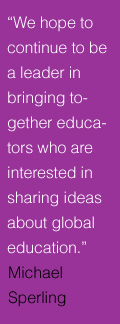
|
The Dialogue ContinuesFairleigh Dickinson was the first ACE Internationalization Collaborative member to host a regional meeting exploring global learning. The collaborative is an invitational forum with approximately 45 colleges and universities committed to advancing internationalization. “We’re proud that ACE chose to partner with us and recognized us as playing a leading role in offering a global education,” said Michael Sperling, associate provost for interdisciplinary, distributed and global learning. “It was a very lively couple of days, and we all learned a lot.” Sperling said the University would be active in upcoming events with the ACE Internationalization Collaborative and perhaps host another global education conference in the future. “We hope to continue to be a leader in bringing together educators who are interested in sharing ideas about global education and making it real on their campuses.” |
|
FDU Magazine Directory | Table of Contents | FDU Home Page | Alumni Home Page | Comments |
|